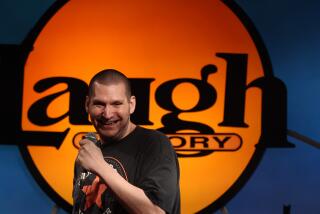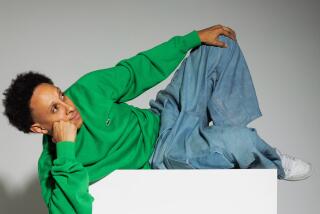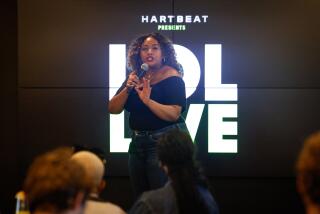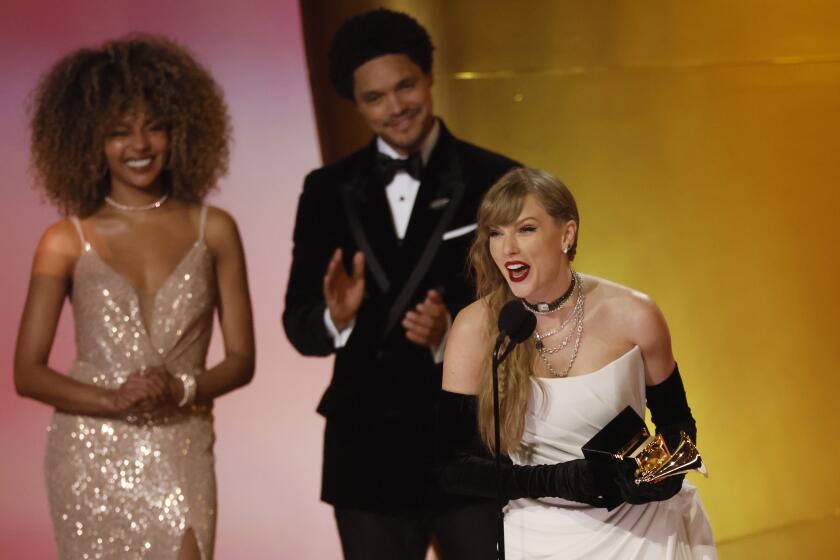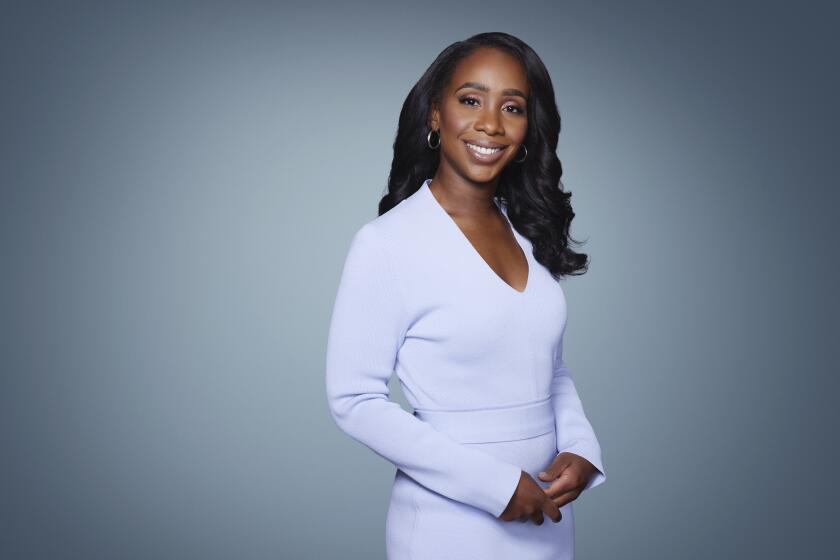A freewheeling (and often free) comedy scene emerges downtown
On a recent Thursday night the Downtown Art Walk raged on. Hipster foot traffic clogged the sidewalks; the heavy scent of food truck grease hung in the air; somewhere in the distance, a blaring New Year’s Eve-like horn cut the urban white noise.
But deep beneath a nearby loft building, a different event was taking shape. It might have been the city’s most spirited live comedy show at the moment — though it wasn’t easy to find. Guests had to navigate the cavernous halls of the SB Manhattan lofts, ride the elevator to the basement, then cut through one apartment’s living room to get to a subterranean courtyard where, in a clearing, the show was just getting started.
Downtown L.A. has long since proved itself as a night-life destination rife with bars, restaurants and art happenings. But it hasn’t typically been a hub for live comedy — until recently. Now a vibrant, tight-knit comedy scene — largely catering to emerging comics, but also featuring big names from the alt-comedy world — is reaching critical mass in the neighborhood.
Beneath SB Manhattan lofts, 50-some audience members kicked back in folding chairs, enjoying free boxed wine and snacks. Six comics each performed 10-minute sets, all on a makeshift stage flanked by a bicycle, a deflated basketball and other resident detritus. Admission price? Free. This was Comedy Brewery, a new, monthly stand-up show, started by local resident Michelle Buteau.
“It’s definitely more guerrilla and underground,” Buteau says. “There’s no pressure to bring your club set list. No one’s trying to impress anyone. Anything goes.”
The downtown scene is particularly welcoming to newbies, stylistically experimental and community-driven — call it populist comedy — and it’s also devoid of the doormen, hefty cover charges and two-drink minimums that are signatures of the more established comedy clubs.
In downtown’s Old Bank District and just beyond, roughly eight regular shows have sprung up — including established, pre-booked sketch and stand-up events and looser open-mike nights. Like many nascent subcultures, the quality of the comedy can be hit or miss; but it’s also not uncommon to stumble on big names such as Aziz Ansari, “Conan” opener Jimmy Pardo and Dave Foley from Kids in the Hall headlining or working out bits at local cafes. With its undercurrent of energy and unpredictability, the downtown comedy milieu could be the scrappy, ragtag second cousin of the Eastside’s alternative arts scene, and its rollicking, upstart shows a mecca for emerging comics in Los Angeles.
“Our goal is to break new talent, find new talent, because the Improv only has so many spots they can give out,” says Kevin Garnier, who co-founded the Downtown Comedy Club in 2007 with inaugural “Saturday Night Live” cast member Garrett Morris. It’s the neighborhood’s oldest comedy spot, having arrived even before the now-defunct monthly comedy walk, organized by Brady Westwater, that ran from 2008-09.
“There was nothing here” back then, Garnier says. “We had two very important tasks: marketing the idea of a comedy club, and marketing the idea that you could come downtown and not get stabbed.”
“5th and Spring used to be the corner of crack and eight ball,” Morris says. “Now? Crack and marijuana,” he jokes.
Housed in what they call a “multi-use community space” that has a “Greenwich Village-’Cheers’ vibe,” Morris and Garnier’s über-relaxed comedy club may be the most laid-back of its kind. Shows are held on Friday and Saturday nights only, Morris emcees, the $10 cover is negotiable and audiences are treated to free Twinkies and Ding Dongs. But the club does draw major headliners, such as Greg Proops and Jamie Kennedy, who perform alongside newcomers.
“It feels more like New York,” says self-described “British-born, Iranian, gay, Jew comic” Matthew Nouriel, who performs regularly at the club. “The audiences feel real. It’s not all industry people. It’s kind of the real deal when you think about it.”
“Real” is the vibe Comedy Brewery’s Buteau was going for. Having performed stand-up for more than 10 years, she recently moved from New York to L.A. and was struck by how siloed the local comedy scene seemed to her. “When I perform in New York it’s a mixed crowd — black, white, gay, straight, people from other countries,” she says. “Here, it’s more segregated. There’s the black rooms, the gay rooms, the TV comics crowd, the alternative comics. Everyone sticks to their own.”
Buteau started Comedy Brewery four months ago in part to re-create what she left behind in Manhattan. Basing it downtown made sense. “There’s so many people in a five-block radius, and everyone’s so cool and laid-back and open-minded — that’s why I do it here,” she says.
In fact, the geography of the area — more traditionally urban and walkable — has spurred cross-pollination of all sorts in the downtown comedy scene: Event producers influence one another’s content; hosts perform at one another’s events; audience members show-hop, catching multiple stages a night and mingling with one another, and comics, on the sidewalk.
Many producers schedule shows to maximize this proximity effect. Tuesday nights will often see comics hitting Señor Fish’s weekly open mike, “Big Trouble in Little Tokyo,” at 7 p.m. — then trekking over to the twice-monthly Holy … comedy show at the Downtown Independent Theater at 9 p.m.
With headliners such as Maria Bamford, Louis C.K. and the Sklar Brothers, Holy … is the hipster heavyweight downtown, the big funny man on campus. Last year, Louis C.K. dropped into a show “semi-unannounced,” says the show’s producer, Dave Ross. “Ron Lynch, kind of the godfather of alt comedy, headlined. Then T.J. Miller went on and riffed for 15 minutes off the fact that Louis C.K. was there.”
The Holy … show’s characteristic irreverence and star power not only draws about 100 people a show, but it has influenced multiple comedy start-ups downtown.
“We wanted to put on a show to [spotlight] ourselves and our friends and bigger comics — we looked a lot to [Holy …] as a model,” says Josh Androsky, co-founder of the monthly Hamclown show in the Alexandria Hotel. “But we also wanted to do something different to set ourselves apart.”
Androsky says that the fly-by-the-seat-of-your-pants atmosphere downtown provides a degree of freedom for comics. Hamclown has translated that into a stand-up show with interactive sketch elements and a musical act to follow. “There doesn’t have to be this rigid structure of jokes-jokes-buy-a-drink, jokes-jokes-racism, jokes-jokes-misogyny. You don’t have to be as structured,” he says. “Because it’s such a blank canvas, we can run amok and do whatever.”
“Whatever” seems to be the buzz word over at Harlem Place Café, which hosts the weekly variety show “If This Doesn’t Work I’m Moving Home.” “It’s a place for us to experiment,” says Anthony DeVries, a producer of the show. “Demetri Martin has played here … we’ve had a guy fillet a fish onstage, everything.”
The cafe’s surrounding area, 4th and Spring streets, is not just walkable, DeVries says, but uniquely “small town” in demographic structure. “A lot of [residents] live here, work here, a lot of us don’t have cars, or work from home,” he says.
That insularity has, at times, even affected the comedy itself, breeding material that’s not just hyper-local, but granularly so. Jokes on downtown stages often traverse the terrain of loft laundry rooms, idiosyncratic yoga teachers, local street characters and the gentrification of the neighborhood.
“You’ll see comedy about how the neighborhood is changing, what direction it’s going in — it’s got a more personal perspective,” says Harlem Place Café customer Barrett Morse, who lives around the corner. “They’re telling stories about a shared community experience. There’s roots to the comedy scene here.”
As in most small towns, word of mouth is key. “I was amazed how quickly our show picked up steam,” says Patrick Granfar of his twice-monthly Swanky Comedy at the First & Hope Downtown Supper Club. “Downtown in general seems to be a little less bourgeois, a little more artsy — it’s what Hollywood used to be 15 or 20 years ago. It’s a fresh scene.”
More to Read
The biggest entertainment stories
Get our big stories about Hollywood, film, television, music, arts, culture and more right in your inbox as soon as they publish.
You may occasionally receive promotional content from the Los Angeles Times.
